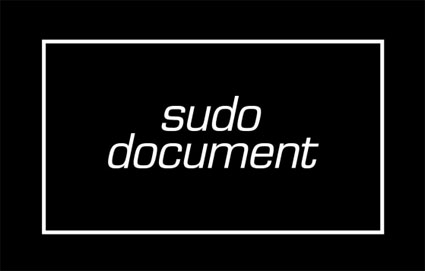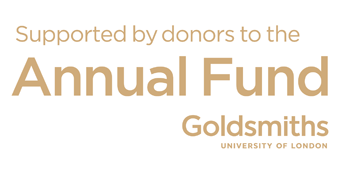The Modern Language Experiment presents
Sudo Document
Sudo, in its purest form, evokes ownership ‘su’ and action ‘do’.
As the education sector in the UK moves into a new unprecedented period of change we feel that it is important to take ownership of our own educational paths and evoke action.
We are pleased to present “sudo document”, an educational programme consisting of a series of lectures and talks that will allow accessibility to the thoughts, ideologies and pedagogical studies of important Curators, Artists and Gallerists throughout the UK working both independently or through institutions.
These lectures, once presented, will be edited and broadcast immediately online serving as both a ‘sudo document’ and a reference video to be viewed at all times.
These lectures and talks will then form a publication that will be launched after the educational programme is completed; this will feature an over view of the programme as well as artworks and writings from all the contributors. This will be made available for reference at insitutional libraries (Goldsmiths College, Central St.Martins) and also for sale in bookshops.
Lecture programme for August - September 2012 at
Lubomirov-Easton
31st August - Mark Jackson 6.30 – 8pm
8th September – Cedar Lewisohn 3 – 4pm
15th September – Carlos Noronha Feio 3 – 4.30pm
Lecture programme for December 2012 at
Angus-Hughes Gallery
8th December - Cathy Lomax 3 - 4.30pm
9th December - Colin Perry 1 - 2.30 pm
9th December - Jon Cairns 3 - 4.30pm
Carlos Noronha Feio - Has a diverse practice that includes actions, performance, video, drawing, painting, photography and installation as research into cultural, local and global identity. He frequently adopts culturally significant images, locations and symbols as a form of creative interference with meaning, and demonstrates the almost arbitrary nature in which cultural significance is adopted or interpreted. Noronha Feio runs The Mews Project Space, an artist run project in an out building located in an alley at the back of the newly refurbished Whitechapel Art Gallery.
He is currently doing a PhD at the Royal College of Art where he is researching dispositifs that artists and non artists alike can assimilate and disseminate. Enabling them to employ in a non abstract manner, strategies that empower the individual in relation to the modern state, to the Sovereign.
For this talk, Noronha Feio will be speaking about his Art4Debt project, and the way that utilising the language of finance a sense of true Global citizenry, of borderlesness and real accountability can be reached.
Cathy Lomax - Is an artist and Director of Transition Gallery. Transition is an independent and innovative gallery and publisher founded in October 2002. The gallery shows work by both emerging and established contemporary artists as well as producing publications and periodicals. Cathy's lecture will be about:
The traditional gallery system is distasteful – gentleman gallerists carousing with oligarchs to flog overpriced artworks by artists who often profess to have a social conscience. The alternative is working within the subsidised arts where securing funding is a prize only awarded to those who know how to play the game.
The whole system is full of contradictions and being an artist is as hard as it always has been. Artists need to take control and devise new models – stop the researching and the empty words and start doing. The way forward is not to compartmentalise but to integrate the making, showing, working and watching.
Cedar Lewisohn – Is an artist and curator based in London. He curated the exhibition Street Art at Tate Modern in 2008 and co-curated the exhibition Rude Britannia at Tate Britain in 2010. In 2010 he co-curated the UK touring exhibition Orbitecture and in 2012 he curated the exhibition Les Flaur de Mal at the BWA Gallery, Wrocław , Poland. In 2008 he wrote the book, Street Art: The Graffiti Revolution (Tate), and in 2011 his book Abstract Graffiti was published by Merell.
Cedar will be speaking about his art practice and how this informs his curatorial practice.
Colin Perry - Is a freelance art writer based in London, UK. Colin writes reviews and profiles for Art Monthly, Frieze, ArtReview, Art in America, Modern Painters, Catalogue magazine, MAP, and catalogue texts. Currently he is working part-time as an editor at Phaidon and has presented talks with artists and academics, organised film screenings, and collaborated with artists on texts and performances. For his lecture Colin will be discussing:
Into the mainstream: Experimental film and video on TV
In recent years, there has been a growing interest in artistic strategies for intervening in broadcast television. At the same time, there has also been a expanding fascination with typologies of documentary film and video, with essay-film formats appearing in galleries across the global art network. These forms have an entwined history that is rarely discussed; their existence has important implications for how we produce and consume artistic forms and for how artistic production is funded.
There is a long history of experimental documentary in Britain, from the GPO to Channel Four’s investment in experimental film and video. But these changes have not taken place ‘top-down’. Rather, artists to have been able to win funding by forming pressure groups and collectives and combining across sectarian divides. This history shows that – even in a recession – the power of combination and collectivity can create opportunities for art beyond the commercial sphere. The talk will explore these concerns, using the works of Stuart Marshall and Marc Karlin as an example.
Jon Cairns - Is Co-ordinator of Critical Studies for BA Fine Art at Central St. Martins.
Jon's work in the last few years has engaged with queer historiography and the ambivalence of interpretation, hinging on the mobile relationships between photography and performance, and between ‘fact’ and ‘fiction’. For his lecture Jon will be disscussing:
Feeling Your Way: art, affect and value in times of recession
There has been a renewed urgency to questions of value in the context of cultural retrenchment (brought on by cuts to arts funding, education spending etc) and the consequent threat of a return to old hierarchies of class and access when it comes to the production of fine art. In the course of my research for a special issue of Visual Culture in Britain, I have come into contact with numerous small and independent artist-run initiatives, who have repeatedly stressed the value and importance of collaboration, informality and surprise. I note a frequent prioritisation of ‘content’ and the critical encounter with art over the usual exigencies of commerce and funding.
The significance of the intuitive, the experiential, the quality and range of audience response may be perennial concerns, but I wonder whether this emphasis on the ‘affective’ structures of art – its display, how we interact with it and come to understand it – has a particular resonance right now. What kind of affective communities does art solicit and construct today? What might affect’s political value be in a moment of cultural crisis?
Mark Jackson – Is a curator both at IMT Gallery, which he co-founded in 2005, and independently. After receiving a First in Fine Art Painting at the University of East London he studied an MA in Fine Art Media at the Slade School of Fine Art, specialising in sound and audiovisual practice. He has a particular interest in inter-disciplinary practice and is also an associate lecturer at London College of Communication where he is currently writing up his PhD.
His research considers the experiments with sound and concepts of space of William S. Burroughs in the '60s and '70s as the basis for a curatorial strategy for sound art. His research has led to him curating exhibitions around previously unexhibited work by William Burroughs: Dead Fingers Talk at IMT Gallery in 2010, which toured to Galleri Box, Gothenburg, in 2012, Silencer at Payne Shurvell, London, in 2010 and the recent Swarms of Black Flies Make the Roses Purple at IMT Gallery in 2012.
Mark is a frequent guest speaker and lecturer in a broad range of fields including fine art, arts funding, music and curating, and was visiting professor at Trinity College of Music in 2004. He is currently working on the forthcoming programme of exhibitions at IMT Gallery alongside projects at Angus-Hughes Gallery and the London College of Communication. For his lecture he will be discussing the relationship between his role as curator at IMT Gallery and his PhD research.

Lectures will take place at the following galleries:
August - September 2012
Lubomirov-Easton
Enclave 8, 50 Resolution Way
Deptford
London
SE8 4AL
December 8th & 9th 2012
Angus-Hughes Gallery
26 Lower Clapton Rd
(at the junction of Urswick Rd)
London
E5 0PD
Media
Images

